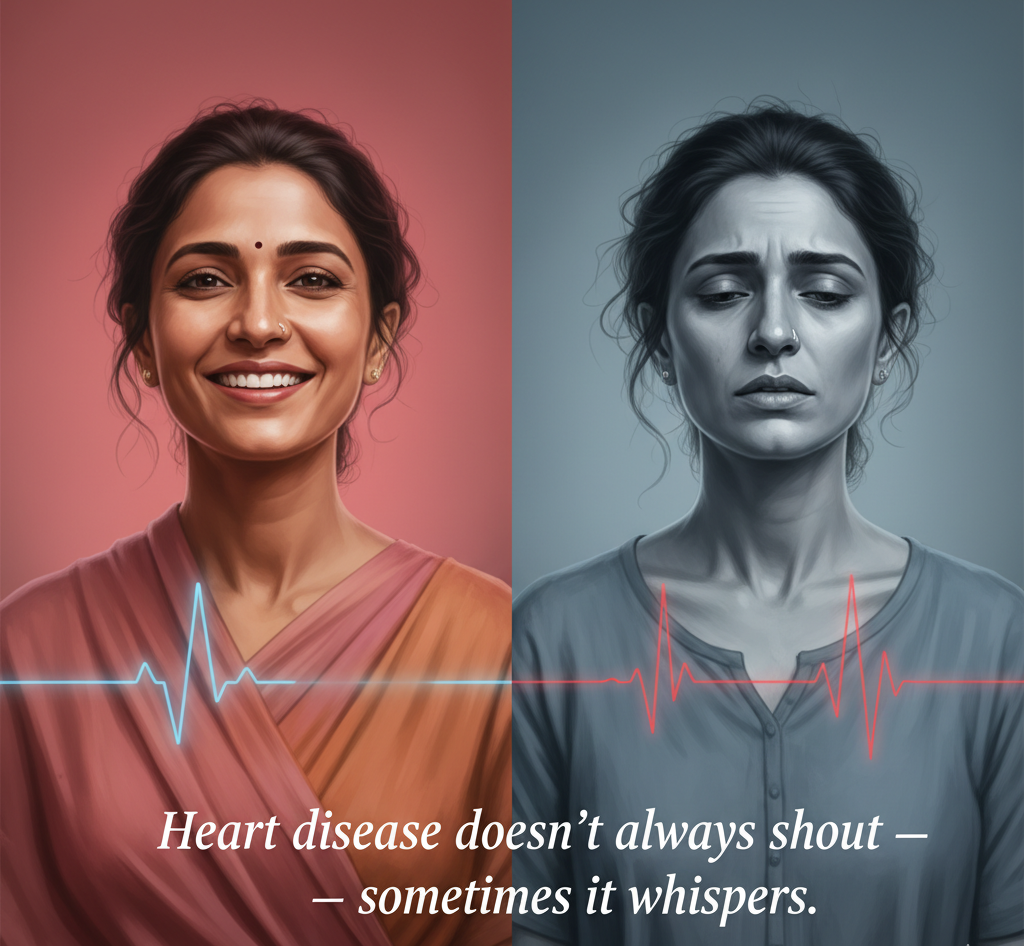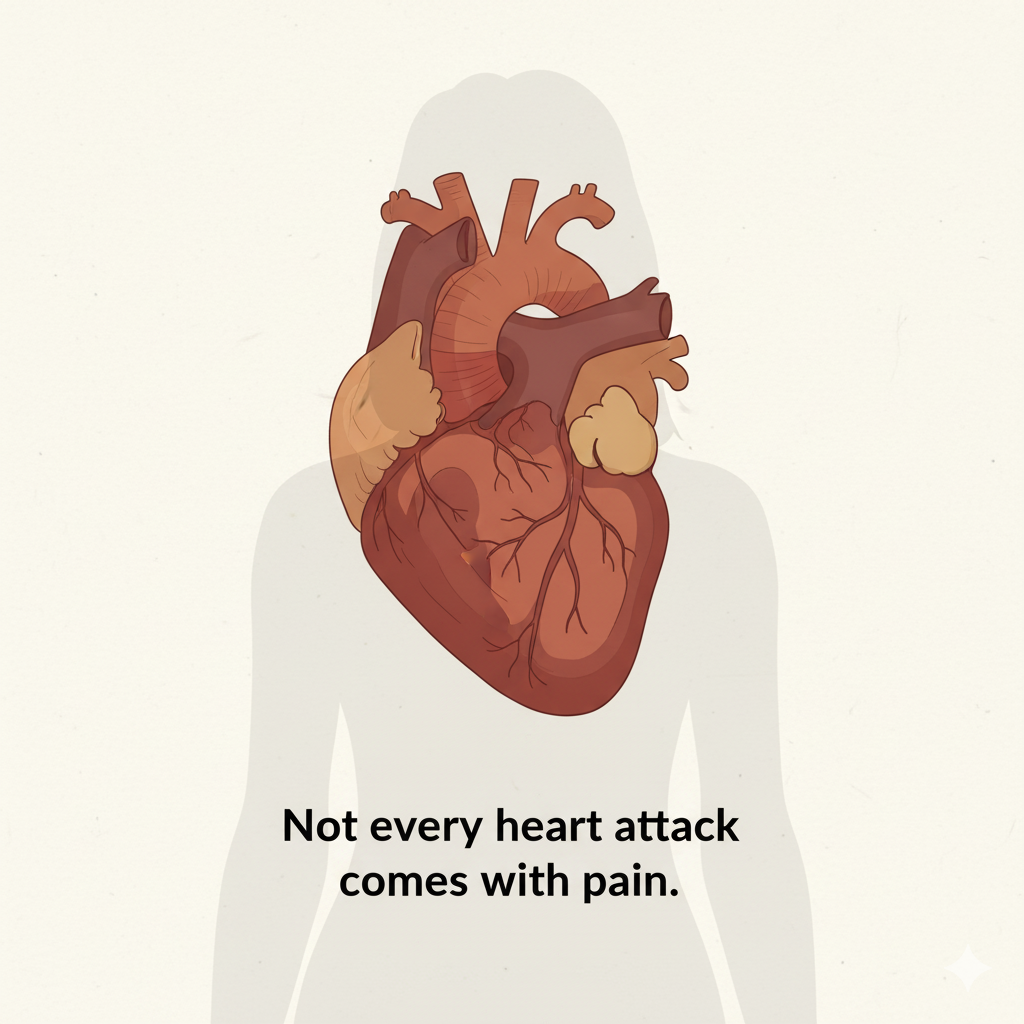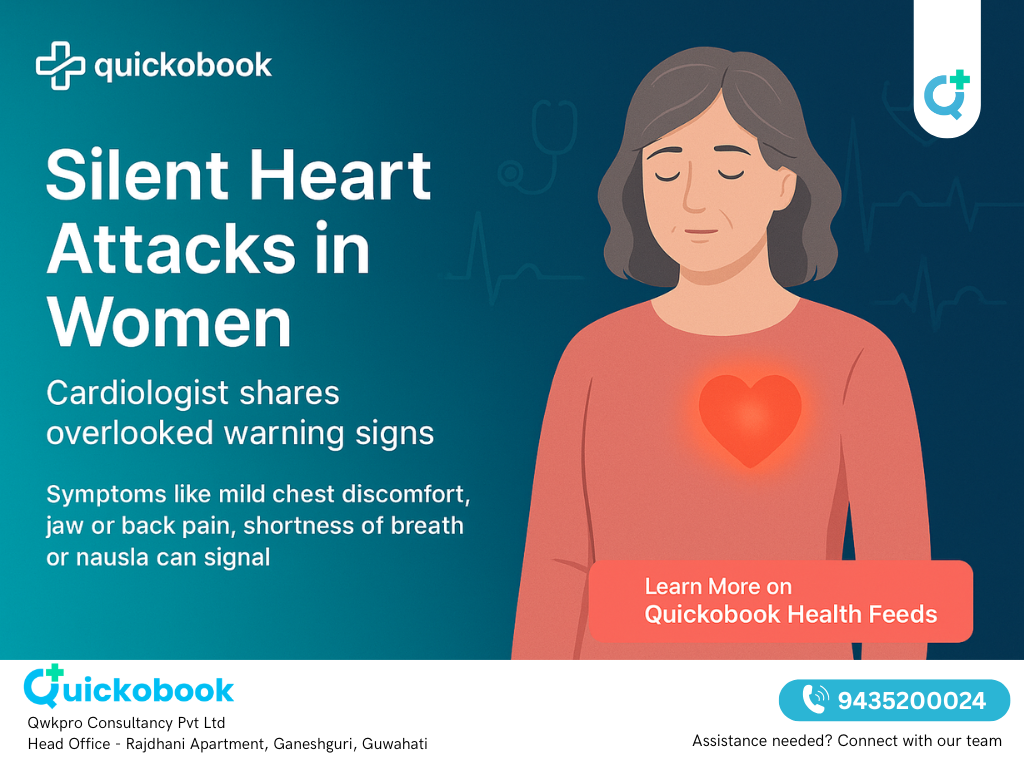Introduction
Heart disease is often seen as a “man’s problem,” but in reality, it’s one of the leading causes of death among women in India. What makes it even more dangerous is the occurrence of silent heart attacks — those that happen without the typical crushing chest pain most people expect.
A cardiologist warns that many women mistake these subtle symptoms for fatigue, stress, or indigestion. Recognizing the overlooked warning signs early can be lifesaving. This article breaks down what every woman should know about silent heart attacks, the role of chest pain and high blood pressure, and how to protect your heart health.

What Is a Silent Heart Attack?
A silent heart attack occurs when blood flow to the heart muscle is blocked, but the typical symptoms are mild or go unnoticed. Unlike a classic heart attack that brings severe chest pain, these may show vague or subtle signs — often mistaken for acidity, muscle strain, or anxiety.
According to cardiologists, many women realize they’ve had a silent heart attack only after a routine ECG or heart screening.
Silent heart attacks are dangerous because:
- They cause damage to the heart muscle.
- They increase the risk of future heart failure.
- They often go untreated for too long.

Why Women Are More Vulnerable
Women experience heart attacks differently due to hormonal, anatomical, and lifestyle factors:
- Hormonal influence: Estrogen provides some protection before menopause, but after menopause, risk increases sharply.
- Atypical symptoms: Women may have fatigue or back pain instead of chest pain.
- Delayed diagnosis: Women often ignore mild signs or attribute them to stress.
- Higher blood pressure and diabetes risk: These silent contributors increase the likelihood of heart issues.
Cardiologists emphasize that awareness, not fear, is the key. Knowing your body and seeking help promptly can prevent complications.

Overlooked Warning Signs of a Silent Heart Attack in Women
Many women describe their symptoms as “just feeling off.” Here are the subtle signs a cardiologist says you should never ignore:
1. Unusual Chest Discomfort
- Mild, squeezing, or burning sensations rather than intense pain.
- Feels like tightness, heaviness, or pressure — sometimes mistaken for acidity.
2. Shortness of Breath
- Difficulty breathing even without physical activity.
- May occur while resting or during sleep.
3. Fatigue and Weakness
- Sudden, unexplained tiredness.
- Commonly dismissed as overwork or lack of sleep.
4. Upper Body Pain
- Pain in the back, neck, jaw, or arms without clear reason.
- Sometimes radiates to the left shoulder.
5. Nausea or Indigestion
- Women often feel like they have stomach upset rather than heart pain.
6. Dizziness or Lightheadedness
- Feeling faint, especially after minimal activity.
If you experience these symptoms along with high blood pressure, sweating, or a sense of unease, seek immediate medical care.
READ ALSO: Doctors Urge Parents To Prioritise Vaccination As Pneumonia Cases Surge Among Children In Bengaluru
Causes and Risk Factors
Cardiologists point out that silent heart attacks are linked to the same factors as traditional ones — but they progress quietly.
Major Causes:
- Plaque buildup in coronary arteries (atherosclerosis).
- Blood clot formation.
- Restricted oxygen supply to heart tissue.
Risk Factors for Women:
- High blood pressure (hypertension).
- High cholesterol.
- Diabetes.
- Smoking and alcohol use.
- Sedentary lifestyle.
- Stress and anxiety.
- Family history of heart disease.
Diagnosis: How Cardiologists Detect a Silent Heart Attack
Because symptoms are mild, many women only discover a silent heart attack after damage is done. Cardiologists recommend the following diagnostic tests:
- Electrocardiogram (ECG): Detects abnormal heart rhythms or previous heart damage.
- Echocardiogram: Uses sound waves to visualize the heart’s structure.
- Blood tests: Check for elevated cardiac enzymes like troponin.
- Coronary angiography: Determines blockages in heart arteries.
- Stress test: Evaluates heart function under physical activity.
Early screening is especially important for women with high blood pressure or diabetes.
Treatment Options
Treatment depends on how early the silent heart attack is detected. A cardiologist typically recommends:
- Medications
- Antiplatelet drugs (e.g., aspirin).
- Cholesterol-lowering medicines (statins).
- Blood pressure control medicines.
- Beta-blockers and ACE inhibitors to improve heart function.
- Lifestyle Modifications
- Heart-healthy diet (low salt, rich in fruits and whole grains).
- Regular physical activity like walking or yoga.
- Weight management.
- Stress reduction through meditation or breathing exercises.
- Procedures (if necessary)
- Angioplasty with stent placement.
- Coronary artery bypass surgery for severe blockages.
Living With High Blood Pressure: Protecting Your Heart
High blood pressure silently damages your arteries, making them stiff and narrow — increasing heart attack risk.
Tips from Cardiologists:
- Monitor your blood pressure regularly.
- Limit salt intake to less than 5 grams per day.
- Eat potassium-rich foods like bananas and spinach.
- Avoid smoking and alcohol.
- Take prescribed medication regularly.
Lifestyle Tips for a Healthy Heart
A cardiologist-approved heart care plan includes:
- Eat balanced meals with less oil and sugar.
- Engage in 30 minutes of brisk walking daily.
- Sleep for 7–8 hours a night.
- Practice mindfulness or yoga.
- Avoid prolonged stress and multitasking.
- Get annual heart checkups after 40 years of age.
When to See a Cardiologist
Consult a cardiologist immediately if you experience:
- Persistent or unusual chest pain.
- Breathlessness or fainting spells.
- Uncontrolled high blood pressure.
- Swelling in ankles or legs.
- Rapid or irregular heartbeat.
Remember: “Time is muscle.” The sooner you act, the more heart muscle you save.
Possible Complications of a Silent Heart Attack
If untreated, a silent heart attack can lead to:
- Heart failure.
- Irregular heartbeat (arrhythmia).
- Stroke.
- Recurrent heart attacks.
- Sudden cardiac death.
Prevention: A Cardiologist’s Advice
To lower your risk:
- Control blood pressure and cholesterol.
- Manage diabetes.
- Exercise regularly.
- Eat more fruits, vegetables, and whole grains.
- Quit smoking and limit alcohol.
- Keep regular medical appointments.
Conclusion
Silent heart attacks in women are often missed because symptoms differ from those in men. But your body always gives clues — chest tightness, fatigue, or breathlessness are not normal. Listen to your body and take action.
A cardiologist’s advice is clear: “Don’t ignore discomfort, even if it feels mild. Early detection saves lives.”
Prioritize your heart health today by booking a cardiology check-up with a trusted specialist on Quickobook.
Quickobook CTA
Book your Cardiologist consultation or Heart Health Check-Up today through Quickobook.com.
Easy online booking
Verified doctors near you
Instant teleconsultation options
Affordable cardiac tests in INR
Your heart deserves expert care — don’t wait for warning signs. ????
Disclaimer:
This article is for educational purposes only and should not replace medical advice. Always consult a qualified cardiologist or healthcare provider for diagnosis and treatment.
FAQs (50 Expert Answers)
1. What is a silent heart attack?
A heart attack with mild or unnoticed symptoms, often discovered later through tests.
2. Can women have a heart attack without chest pain?
Yes, women often experience fatigue, breathlessness, or nausea instead of pain.
3. How do cardiologists detect silent heart attacks?
Through ECG, echocardiogram, and blood enzyme tests.
4. Are silent heart attacks dangerous?
Yes, they damage heart muscles and increase future risk.
5. Can high blood pressure cause silent heart attacks?
Yes, it strains arteries and can trigger blockage.
6. How long can a silent heart attack last?
It can last several hours to days without obvious symptoms.
7. What is the first sign of a heart problem in women?
Unusual fatigue or mild chest tightness.
8. Can stress trigger a heart attack?
Yes, stress raises blood pressure and inflammation.
9. Is silent heart attack more common in women?
Yes, due to hormonal and symptom differences.
10. What test confirms a heart attack?
Troponin blood test and ECG.
11. Can I survive a silent heart attack?
Yes, with early diagnosis and proper care.
12. Does chest pain always mean a heart attack?
No, but any persistent pain must be checked.
13. Can young women have heart attacks?
Yes, especially with high BP, diabetes, or smoking.
14. What foods are bad for heart health?
Processed foods, excess salt, and sugary drinks.
15. How does diabetes affect the heart?
It damages blood vessels and increases attack risk.
16. Does menopause increase heart risk?
Yes, loss of estrogen raises cholesterol and BP.
17. Can silent heart attacks cause anxiety?
Yes, due to irregular heartbeat or fear after diagnosis.
18. What’s the difference between heartburn and heart attack?
Heartburn improves with antacids; heart pain does not.
19. Can exercise prevent heart disease?
Yes, it lowers BP and improves circulation.
20. What is normal blood pressure?
Below 120/80 mmHg.
21. Should women over 40 get heart check-ups?
Yes, annually or as advised by a doctor.
22. Can walking improve heart health?
Absolutely — 30 minutes daily helps.
23. Are women’s heart symptoms different from men’s?
Yes, subtler and less localized to the chest.
24. Can dehydration affect heart health?
Yes, it thickens blood and strains the heart.
25. Is family history important?
Yes, genetics play a big role.
26. Can silent heart attacks be reversed?
No, but damage can be managed.
27. How is high BP treated?
Lifestyle changes and medication.
28. What are signs of poor circulation?
Cold hands, tingling, or swelling.
29. Can anxiety mimic a heart attack?
Yes, but only a doctor can confirm.
30. How do I lower cholesterol naturally?
Eat oats, nuts, and avoid trans fats.
31. What’s the link between obesity and heart disease?
Extra weight strains the heart and raises BP.
32. Can yoga improve heart health?
Yes, by reducing stress and BP.
33. Are heart attacks hereditary?
Partly — lifestyle also matters.
34. Can low blood pressure cause heart attacks?
Rarely, but extreme drops can reduce oxygen flow.
35. What’s the best diet for heart patients?
DASH or Mediterranean diet.
36. Can silent heart attacks happen during sleep?
Yes, some occur at night unnoticed.
37. How do I check if my chest pain is serious?
If it lasts >5 minutes or worsens, seek help immediately.
38. Can aspirin stop a heart attack?
It can reduce clotting — use only under doctor’s advice.
39. Can heart attacks be completely prevented?
Risk can be lowered but not eliminated.
40. What is cardiac rehabilitation?
A supervised recovery program post-heart attack.
41. Can emotional stress affect the heart?
Yes, it releases hormones that raise BP.
42. How much salt is safe daily?
Less than one teaspoon (5g).
43. Can women recover fully after a heart attack?
Yes, with prompt treatment and healthy habits.
44. What is angina?
Chest discomfort due to reduced blood flow.
45. Is chest pain always on the left side?
Not always — can appear in center or right side too.
46. Can frequent headaches indicate high BP?
Yes, especially if persistent or severe.
47. Should I monitor heart rate daily?
Yes, especially if you have high BP.
48. Can cold weather trigger heart problems?
Yes, by raising BP and tightening arteries.
49. How to lower BP quickly?
Deep breathing, hydration, and medication if prescribed.
50. When should I call an ambulance?
If you feel faint, short of breath, or have persistent chest pain.










Comments (0)
No comments yet. Be the first to share your thoughts!
Leave a Comment